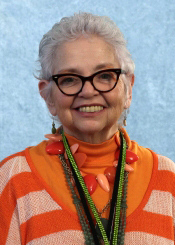Communication studies lecturer Marde Gregory retires after 41 years

(UCLA Department of Communications Studies)
By Melody Teng
June 22, 2015 1:11 a.m.
Marde Gregory opened a desk drawer in her office to reveal a heap of colorful socks, and tried to offer a pair to one of her students.
“I get cold when I see students wearing no socks,” Gregory said.
Gregory said she wants students to consider her feelings about getting cold easily and encourages them to dress accordingly to develop and show empathy, a trait she said is necessary to communicate eloquently.
Gregory, a UCLA alumna, taught at the university as a senior lecturer in the communication studies department for 41 years. She retired this month and plans to write a book about the importance of combining sciences with the humanities as well as ways to become an effective communicator.
This year, a group of communication studies alumni, including several of Gregory’s former students, created the Marde Gregory Student Award in Communications to honor the retired professor and outstanding communication studies students.
Tim Groeling, chair of the communication studies department, said the fund would be endowed once it reaches a six-figure value. Thus far, the group has raised a five-figure amount and plans to continue fundraising efforts within the communication studies department.
He added that they hope Gregory will help select the award’s recipients.
“Marde has been known at UCLA for her intense mentorship of outstanding students, so the funds will help carry on that legacy now that she is retired,” Groeling said in an email.
During Gregory’s time as a lecturer, she taught a class on speech and storytelling, and another on internships in communications fields. She said she believes the ability to tell a good story is important to succeed in the real world.
“What kind of story does not matter,” she said. “There are no boring subjects, only boring people.”
As the self-proclaimed “kindest mean person” she said her students will encounter, Gregory openly criticizes her students in an effort to prepare them for the real world. Gregory said her students learn to appreciate her criticism because they know how deeply she is devoted to them.
Kayla Hausmann, a rising second-year communication studies student, said her initial encounters with Gregory felt jarring and abrasive.
But Hausmann said she is glad she withstood what she saw as Gregory’s forceful and precise criticisms because she has since learned from her errors and become a better communicator.
“She taught me (that) an effective communicator should speak with audiences (rather than to them), and create an exchange that keeps both listeners and speakers engaged,” Hausmann said, recalling a lesson from one of Gregory’s classes.
Gregory, a faculty member since 1973, said she oversaw three distinct generations of students during her time as a professor and has witnessed numerous changes to the university.
Gregory’s former students include a judge on the U.S. Court of Appeals for the 9th Circuit and executives in the entertainment industry.
“I was lucky (I was there to) teach them to talk,” Gregory said. “I studied them and taught them to realize their potentials.”
Gregory said students seemed more ambitious when she first started to teach than they do now. She added she thinks students today have changed and become less motivated and goal-oriented. She said millennials are inept communicators because they overuse social media.
“Electrical equipment short-circuits our ability to communicate,” she said. “We’re not thinking, loving or judging what we are saying when we are clicking ‘like’ on Facebook.”
Gregory said she thinks students should be introspective about their abilities. She explained that people need to be realistic about what they do and don’t do well in order to be successful.
Gregory said she believes the success of an educator depends on his or her passion and devotion to students. She added she believes a professor has failed at his or her job if students are unable to apply new information.
“What matters is whether students can take what (they have) learned in that class out to the world,” Gregory said. “That’s how a student pays it forward, by sharing the thinking skills he or she has acquired at school and sharing them with the world.”


